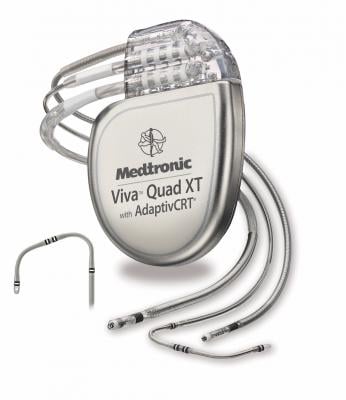
May 22, 2018 — Medtronic plc announced study results showing its AdaptivCRT algorithm is associated with improved patient survival. The data were presented at Heart Rhythm 2018, the Heart Rhythm Society's 39th Annual Scientific Sessions, May 9-12 in Boston.
In a real-world, prospective registry of 1,835 patients, use of the AdaptivCRT algorithm was associated with a 31 percent relative reduction in all-cause mortality compared to conventional cardiac resynchronization therapy (CRT) (p=0.02). The AdaptivCRT algorithm personalizes therapy, adjusting how the implanted CRT device paces the heart according to minute-to-minute evaluations of each patient's heart rhythm, and is being assessed for superiority over conventional CRT in a randomized clinical trial, AdaptResponse.
"Heart failure patients typically have several other medical conditions and are at risk for frequent hospitalizations and even death," said Jagmeet P. Singh, M.D., Ph.D., associate chief of the Cardiology Division of Massachusetts General Hospital in Boston. "The AdaptivCRT algorithm is not only linked to improved patient survival, but it also has previously been shown to reduce the risk of atrial fibrillation and hospital readmissions."
Atrial fibrillation (AF), an irregular quivering or rapid rhythm in the heart's upper chambers, is one of the most common heart rhythm disorders, and a large percentage of heart failure patients also have AF.1 Prior analyses of AdaptivCRT have shown a 46 percent reduction in episodes of AF lasting more than 48 hours, compared to patients treated with conventional CRT.2
Additionally, AdaptivCRT allows physicians to tailor CRT to the individual needs of each patient, which has been shown to translate into a 59 percent reduction in a patient's odds of a 30-day heart failure readmission.3 Evidence from the Adaptive CRT randomized clinical trial further demonstrated that AdaptivCRT increases CRT response rate, reduces unnecessary right ventricular pacing, and improves clinical outcomes for patients with normal AV conduction.4-7
Heart failure is a progressive condition, affecting more than 26 million people worldwide, consuming intensive resources during hospitalizations and continuing to cause problems following hospital stays, with 90-day readmission rates of 40 percent.8 CRT is an established treatment for some heart failure patients that uses an implantable defibrillator (CRT-D) or pacemaker (CRT-P) to improve the pumping efficiency of the heart.
For more information: www.medtronic.com


 December 19, 2025
December 19, 2025 









